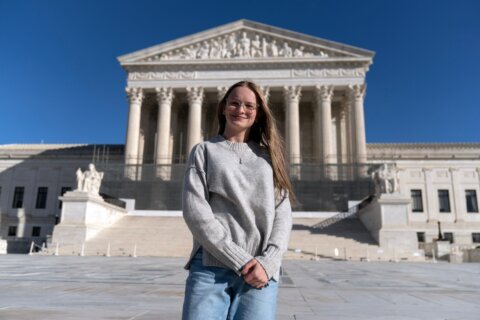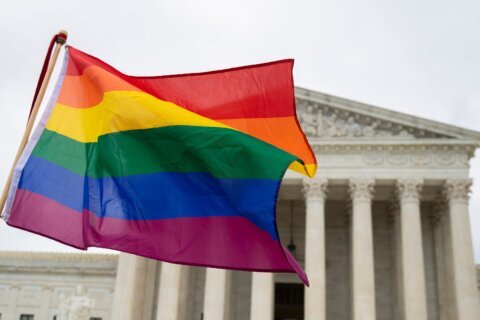This article was republished with permission from WTOP’s news partners at Maryland Matters. Sign up for Maryland Matters’ free email subscription today.
A group of Montgomery County parents has asked the Supreme Court to review the school system’s refusal to let them opt their children out of classes that use LGBTQ+ books in lower elementary school grades.
The petition, filed last week, claims the school system’s refusal to let parents opt their children out of the classes infringes on their religious liberty rights by exposing the children to gender and sexuality norms that contradict their religious beliefs.
The policy gives parents – who include Muslim, Catholic and Ukrainian Orthodox families – “no protection against forced participation in ideological instruction by government schools,” as their petition claims.
A Montgomery County school spokesman said the system was aware of the Supreme Court appeal and was reviewing it, but that the system would not comment on ongoing litigation.
The appeal is the latest twist in a case that began two years ago, when the schools unveiled a list of “LGBTQ+-inclusive texts for use in the classroom.” Those included books to be used in lower grades, including one for use in kindergarten and pre-K classrooms.
The books were introduced in the 2022-23 school year and are not part of a mandatory reading list for the classrooms but can be used by teachers in classroom instruction.
At issue are seven books in the lower grades, which include titles such as “My Rainbow,” which tells the story of a mother who creates a rainbow-colored wig for her transgender child; “Uncle Bobby’s Wedding,” about a girl worried she will lose time with her soon-to-be-married uncle, until his boyfriend befriends her and gains her trust; and “Pride Puppy,” about a puppy lost at a Pride parade, which uses each letter of the alphabet to describe the people it might have met there. The last book, for kindergarten and pre-K, invites students to search for drag kings and queens, lip rings, leather and underwear, among other items, according to court documents.
In court documents, a school system official said the books were not planned to be part of “explicit instruction on gender identity and sexual orientation in elementary school, and that no student or adult is asked to change how they feel about these issues.” Instead, the official said, teachers were expected to make the books available in the classroom, recommend them as appropriate for particular students or offer them “as an option for literature circles, book clubs, or paired reading groups; or to use them as a read aloud” in class.
Parents who objected to the use of the books were originally allowed to opt their children out of lessons that included the books. But the school system in March 2023 announced that opt-outs would no longer be allowed, beginning in the 2023-24 school year. It said parents can opt students out of parts of sex education, but not other parts of the curriculum, like language arts.
That sparked a lawsuit by a group of parents who objected on religious and secular grounds. They said they were not trying to ban the use of the books in Montgomery County schools but argued that, with no opt-out requirement, they were being forced to expose their children to ideas that conflicted with their firmly held religious beliefs.
So far, the underlying elements of the case have not been heard, merely the parents’ request for a preliminary injunction of the school system’s opt-out policy, which the parents have repeatedly lost.
A federal district judge in August 2023 denied the parents’ request for a preliminary injunction and a divided panel of the 4th U.S. Circuit Court of Appeals upheld that ruling in May, writing that the parents had not met the high burden of showing that they were likely to win on their claim that the lack of an opt-out policy was actually coercing them to abandon part of their faith.
The majority opinion, written by Circuit Judge G. Steven Agee, said that because the record in preliminary injunction hearings was extremely sparse, the parents had not been able to “connect the requisite dots” to show that a burden on their First Amendment rights existed.
While the parents had shown that the books “could be used in ways that would confuse or mislead children and, in particular, that discussions relating to their contents could be used to indoctrinate their children into espousing views that are contrary to their religious faith. … none of that is verified by the limited record that is before us,” Agee wrote.
“Should the Parents in this case or other plaintiffs in other challenges to the Storybooks’ use come forward with proof that a teacher or school administrator is using the Storybooks in a manner that directly or indirectly coerces children into changing their religious views or practices, then the analysis would shift in light of that record,” Agee wrote.
The fact that parents might feel forced to forgo a public school education and pay for private school was not sufficiently coercive to be a burden on the parents’ First Amendment rights, based on the record so far, he wrote.
In a dissent, Circuit Judge A. Marvin Quattlebaum Jr. said parents had met their burden for a preliminary injunction while the case was heard.
“Both sides of the issue advance passionate arguments. Some insist diversity and inclusion should be prioritized over the religious rights of parents and children. Others argue the opposite,” Quattlebaum wrote.
But the parents have made the case for an injunction of the opt-out policy for now, he wrote.
“The parents have shown the board’s decision to deny religious opt-outs burdened these parents’ right to exercise their religion and direct the religious upbringing of their children by putting them to the choice of either compromising their religious beliefs or foregoing a public education for their children,” Quattlebaum wrote. “I would … enjoin the Montgomery County School Board of Education from denying religious opt-outs for instruction to K-5 children involving the texts.”






